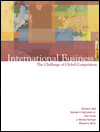Understand the significance of culture for international business.
To be successful in their relationships overseas, international businesspeople must be students of culture. They must not only have factual knowledge; they must also become culturally sensitive. Culture affects all functional areas of the firm. Understand the sociocultural components of culture.
Although experts differ about the components of culture, the following is representative of what numerous anthropologists believe exist: (1) aesthetics, (2) attitudes and beliefs, (3) religion, (4) material culture, (5) education, (6) language, (7) societal organizations, (8) legal characteristics, and (9) political structures. Appreciate the significance of religion to businesspeople.
Knowing the basic tenets of other religions will contribute to a better understand of their followers’ attitudes. This may be a major factor in a given market. Comprehend the cultural aspects of technology.
Material culture, especially technology, is important to managements contemplating overseas investment. Foreign governments have become increasingly involved in the sale and control of technical assistance. Technology may enable a firm to enter a new market successfully even if its competitors are already established there. It often enables the firm to obtain superior conditions for an overseas investment because the host government wants the technology. Grasp the pervasiveness of the Information Technology Era.
Businesspeople must keep abreast of the changes in information technology to avoid falling behind their competitors. The Internet enables small firms to compete in the global market, a fact that provides new opportunities for some firms and new competition for others. Businesspeople who can capture information from transaction data have a significant advantage over those who cannot. The opinion in the retailing industry is that this capability is the primary reason for Wal-Mart’s success, for example. Understand why businesspeople must follow the worldwide trends of formal education.
Figure 9.5 shows the dramatic increase in the educational levels of adults living in countries of all economic levels. International firms must be prepared to meet the needs of better-educated and more sophisticated customers as well as a better-educated work force. Discuss the impact of the “brain drain” and the “reverse brain drain” on developed and developing nations.
Developed nations have received thousands of scientists and highly trained professionals from developing nations without contributing any part of the cost of their education. They also have lost hundreds of scientists who obtained industry experience in developed countries to recruiters from their countries of origin. Appreciate the importance of the ability to speak the local language.
Language is the key to culture. A feel for a people and their attitudes naturally develops with a growing mastery of their language. Recognize the importance of the unspoken language in international business.
Because the unspoken language can often tell businesspeople something that the spoken language des not, they should know something about this form of cross-cultural communication. Discuss the two classes of relationships within a society.
A knowledge of how a society is organized is useful because the arrangement of relationships within it defines and regulates the manner in which its members interface with one another. Anthropologists have broken down societal relationships into two classes: those based on kinship and those based on free association of individuals. Discuss Hofstede’s four cultural value dimensions.
Geert Hofstede, a Danish psychologist, interviewed IBM employees in 67 countries and found that the differences in their answers to 32 statements could be based on four value dimensions: (1) individualism versus collectivism, (2) large versus small power distance, (3) strong versus weak uncertainty, and (4) masculinity versus femininity. These dimensions help managers understand how cultural differences affect organizations and management methods. | 



 2002 McGraw-Hill Higher Education
2002 McGraw-Hill Higher Education